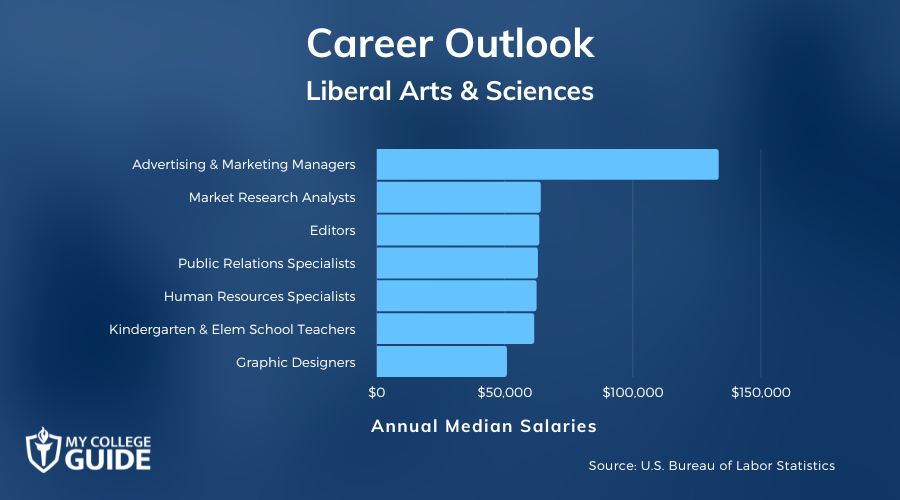Why a liberal arts degree? A liberal arts degree program may be a good idea for you if you’re unsure of a specific major or you want to keep your options open in regard to a career path.

There are a lot of opportunities when you pursue a liberal arts degree program. Throughout the program, you’ll learn a plethora of skills that can be applied in many different industries.
If you like diversity and learning new things, this degree path may be right for you.
What is a Liberal Arts Degree?

A liberal arts degree is the study of various subjects and can equip students with fundamental knowledge in areas such as history, literature, philosophy, mathematics, languages, and more.
A liberal arts degree does not necessarily provide career-focused, specialized skills. Instead, it provides a foundation for learning in a variety of areas via numerous different perspectives or theories.
A liberal arts education benefits students in many ways. Students who earn a liberal arts degree are encouraged to use analytical skills, and communication tools, and demonstrate the ability to consider new topics and scenarios strategically and logically.
Those who hold bachelors in liberal arts degrees may take the next steps towards earning a master’s degree or completing professional certification programs or considering a variety of jobs.
Liberal arts students build their analytical skills, written and oral communication capabilities, and learn different problem-solving theories and critical theories. As a result, their ability to reason, research, and discuss a variety of topics is often valuable in many different professional roles.
A liberal arts education is intended to encourage students to think broadly from different perspectives to interpret and make logical decisions on a multitude of topics. As such, students often follow through and inform processes to analyze and make choices.
What Can You Do With a Liberal Arts Degree?

Why a liberal arts degree? Well, while a liberal arts degree does not always provide job-specific skills, it does offer students the opportunity to develop a wide variety of creative, thoughtful, theoretical, logical, and communications-related talents.
This type of education can be helpful in a variety of careers in which critical thinking, open discussion, logical analysis, and understanding multiple points of view are important.
Professionals in fields such as advertising, marketing, human resources, and journalism are common options for liberal arts students. As noted by the Bureau of Labor Statistics, employment opportunities in many of these fields are expected to grow in the next ten years.
Common Liberal Arts Majors

Those who hold bachelors in liberal arts degrees often choose a particular area of concentration to major in. While each school offers different majors, some common areas are:
- Art History: In this major, students review historical works of art, analyzing the social impact and impetus behind the work.
- Biology: Students of this major will learn about living organisms, from cells to exoskeletons and everything in between.
- Communication: These majors review topics that relate to advertising, marketing, journalism, and public relations.
- Creative Writing: In this major, students will learn the nuances and intricacies of writing, including styles, themes, structure, and theory.
- English: Majors in this field may focus on historical and contemporary literature, and often analyze and review many different writing styles and genres.
- Graphic Design: This major allows students to exercise creativity when using technology to express visual concepts.
- History: In this major, students learn historical events that have occurred worldwide, analyzing all facets of these events’ impact.
- Political Science: These majors study governments, policies, and interactions between political entities, including analyzing opinions, views, and economics.
- Psychology: This major can be helpful for those who plan to get an advanced degree in mental health studies, or who wish to pursue a career in which understanding human behavior may be beneficial.
- Sociology: These majors observe and analyze the behavior of humans in social groups, including race, religion, gender identity, political views, and many other factors.
Liberal arts students may study each of these topics individually, but majors will concentrate most of their studies on a single topic.
Benefits of a Liberal Arts Education
So, what are liberal arts? Liberal arts are the foundation of higher education in America, and they’re still relevant today.
There are many benefits of a liberal arts degree including developing essential skills, networking with like-minded students, and broadening your opportunities after you earn your degree. Before choosing a liberal arts degree, consider some other of the vast benefits.
1. Develop Diverse Skills that Employers Want

“In many respects [the liberal arts are] more valuable as the world has become smaller and more interconnected than ever before,” says Chris Gage, dean of admission at Hanover College (IN).
Some of the more common liberal arts majors include communications, English, foreign language, history, philosophy, political science, mathematics, psychology, economics, and sociology.
There is a direct need for individuals to communicate and appreciate cultural differences. As the world is diverse, employers look to hire individuals that can communicate and understand the world’s differences.
2. Liberal Arts Schools Emphasize Coveted Soft Skills

As a liberal arts student, you’ll take courses in the arts, humanities, social sciences, mathematics, and natural sciences.
You’ll also learn a variety of skills, such as critical thinking, verbal and written communication, and problem-solving, which will help you in the workplace. Leadership skills and the ability to work as a team member are top skills employers look for, and with liberal arts programs, you’ll work on crafting those skills on a variety of projects.
Thomas Crady, vice president for enrollment at Gustavus Adolphus College (MN), agrees. “We hear employers talking about the importance of the ability to work together as teams and complete projects on time. They expect recent graduates to have a strong work ethic and the ability to write clearly and concisely with strong oral communication skills.”
3. You Can Choose From Many Career Paths

There’s no one set career path for liberal arts majors. Liberal arts careers include those in fields such as business, education, media, public service, medicine, and law.
Although technical skills are increasingly necessary for almost every profession, employers now recognize that those skills can be taught on the job. So if you’re worried about competing against those with more “practical” or narrowly defined degrees, such as business or engineering, don’t be.
And if you plan to go on to medical school or law school, a liberal arts education can position you well for success in graduate school.
4. You Demonstrate a Variety of Skills to Employers

In general, the workforce has shifted to focus on jobs that don’t necessarily have a direct correlation to a major.
“Employers instead are looking for those core skills: the ability to communicate effectively through writing and speaking, the ability to work cohesively with a team, the ability to compete in our digital age by quickly picking up new technology, and the ability to look at things with a global focus because most jobs are so globalized in today’s society,” Rachel West, senior admissions counselor at Agnes Scott College (GA) says.
Because of this, the broad subject areas you’ll study in the liberal arts will make you particularly well suited for today’s job market and the jobs of the future. While you’re in college, remember to take advantage of the career preparation resources your college offers so you can increase your odds of success.
5. A Liberal Arts Education Is Affordable

Contrary to popular belief, liberal arts institutions aren’t necessarily too expensive. Although a college’s sticker price may seem high, nearly all institutions offer financial aid that significantly lowers the net cost.
Also, a growing number of universities offer online liberal arts degrees, which are often less expensive because you don’t have to pay for on-campus housing, parking fees, and other expenses associated with on-campus programs.
6. Online Liberal Arts Options Offer Flexibility

If you opt for an online liberal arts degree, you can enjoy the flexibility an online program offers.
With an online program, you can complete your coursework on your own time and set your own schedule for most courses. This allows you to still maintain your daily responsibilities while pursuing your degree.
Along with flexibility, an online program can also offer cost savings as it will cut down on the need to commute, live on campus, and additional expenses like food.
7. Develop Relationships and Networking Opportunities

With a liberal arts program, there are typically projects to complete with other students. This will give you not only team skills and leadership skills but also the opportunity to develop lasting relationships.
Bachelor’s in liberal arts programs can also offer many networking opportunities. The diverse nature of the degree can allow you opportunities to attend many events, join groups, and more. For example, with a liberal arts degree program, you may be invited to many events rather than just medical events for a medical degree and so on.
8. Happiness and Satisfaction

Since a liberal arts degree offers a lot of various opportunities to students, it can allow you the chance to choose the best path for you to ensure your happiness.
You may find that you enjoy humanities, or maybe after working in humanities for a bit, you found you enjoy social sciences, with a bachelor’s degree in liberal arts, you have the freedom to choose among career paths based on your degree and skills acquired.
Liberal Arts & Sciences Careers & Salaries

Students who earn liberal arts degrees often find professions that encourage them to analyze, review, discuss, and carefully consider many points of view.
According to the U.S. Bureau of Labor Statistics (BLS), multi-faceted roles such as that of a Human Resources Specialist are expected to grow by 8% over the next ten years.
| Careers | Annual Median Salaries |
| Advertising, Promotions, and Marketing Managers | $133,380 |
| Market Research Analysts | $63,920 |
| Editors | $63,350 |
| Public Relations Specialists | $62,800 |
| Human Resources Specialists | $62,290 |
| Kindergarten and Elementary School Teachers | $61,350 |
| Graphic Designers | $50,710 |
| Archivists, Curators and Museum Workers | $50,120 |
| Health Education Specialists and Community Health Workers | $48,860 |
| News Analysts, Reporters, and Journalists | $48,370 |
Thanks to the wide array of skills included in earning a liberal arts degree, students may consider many different career paths.
Should I Major in Liberal Arts?

Many individuals with bachelors in liberal arts degrees find the path and process challenging and rewarding, but whether it is right for you depends on your career goals and aspirations.
When choosing a liberal arts degree, you will likely be asked to study a variety of courses, ranging from logical skills such as mathematics, to more subjective areas, like philosophy.
As a result, you will be asked to learn different viewpoints, perspectives, theories, and methodologies that span the globe and human history. Liberal arts students then apply this knowledge to questions, topics, and debates that span subjects.
If you are interested in the “how” and “why” of humanity, and understanding how thoughts, opinions, and actions interconnect, this program may interest you.
What Skills Do You Learn in Getting a Degree in Liberal Arts?

Among the liberal arts education benefits are a variety of skills that are helpful in nearly any educational or career path you may wish to follow after graduation.
Some of the common skills learned in a liberal arts degree program are:
- Written and oral communication and presentation
- Deep analysis and evaluation of multi-faceted issues
- Research and information organization
- Creative problem-solving
- Informed and ethical decision-making
With these skills, students may choose to continue their education or select a career in which these skills are helpful.
What is a Liberal Arts Degree Good for?

A liberal arts degree is good for students who may not have a specific trade or profession in mind during their college experience, but wish to improve their analytical, communication, and critical thinking skills.
They may express creativity through problem-solving in such roles as public relations or human resources specialists, or they may write, edit, and analyze art.
These soft skills can be useful in a variety of careers, including fields in which professionals work with other individuals as leaders or educators.
Is a Bachelor of Liberal Arts Degree Worth It?

Yes, a Bachelor of Liberal Arts degree is worth it for many students. Though some feel that a specialized degree provides more career stability, liberal arts students have many professional options available to them and can tailor their degrees toward their long-term goals.
According to the Bureau of Labor Statistics, job fields in which communication, critical thinking, and analytical skills are expected to grow at a faster-than-average rate among all careers. As a result, professionals with these skills may be in greater demand.
Is a Liberal Arts Major Right for You?

If you feel passionate about a subject outside of the liberal arts, your choice of major may be clear. But if you’re undecided, and you wonder why a liberal arts degree? A major in the liberal arts is a good choice because it doesn’t set limits on what you can explore.
For example, while studying biology, you may discover a passion for working in a laboratory. Or while studying English, you may get an internship at an advertising agency and discover your love for copywriting. You can begin exploring your interests and possible liberal arts majors in high school. Campus visits can help you determine what type of college is best for you.
If a liberal arts program sounds like something that may be right for you, start researching online accredited schools that offer liberal arts programs.
